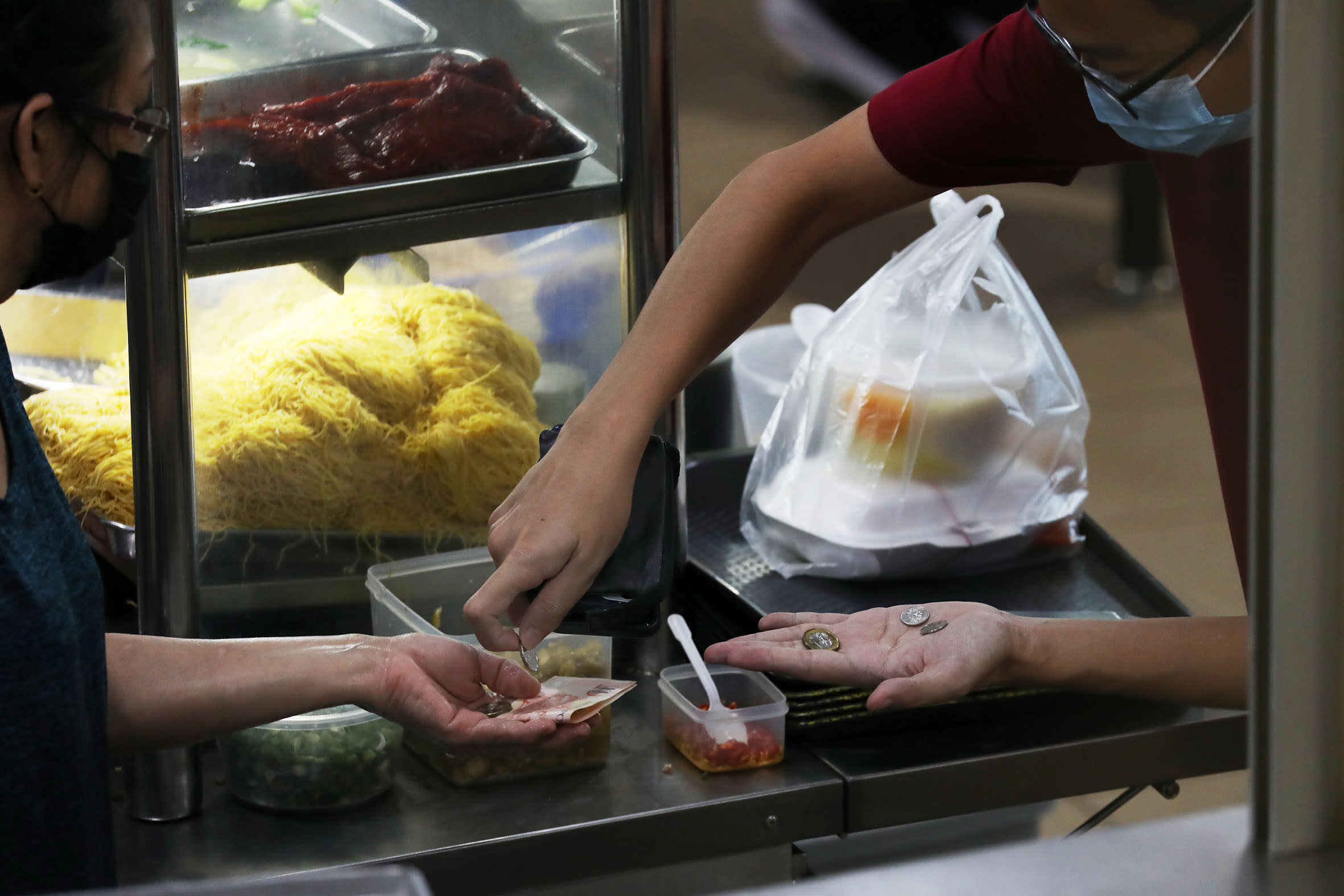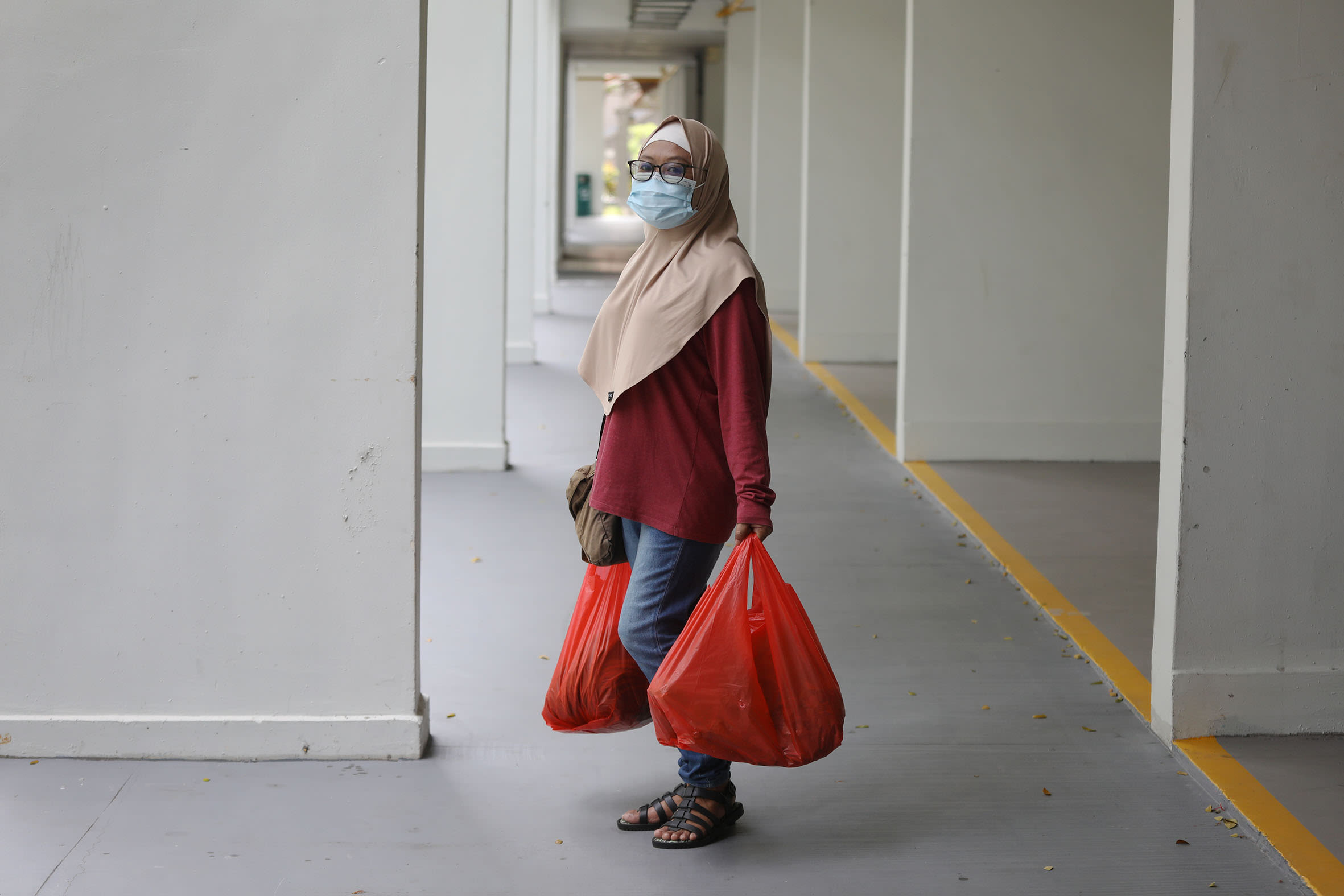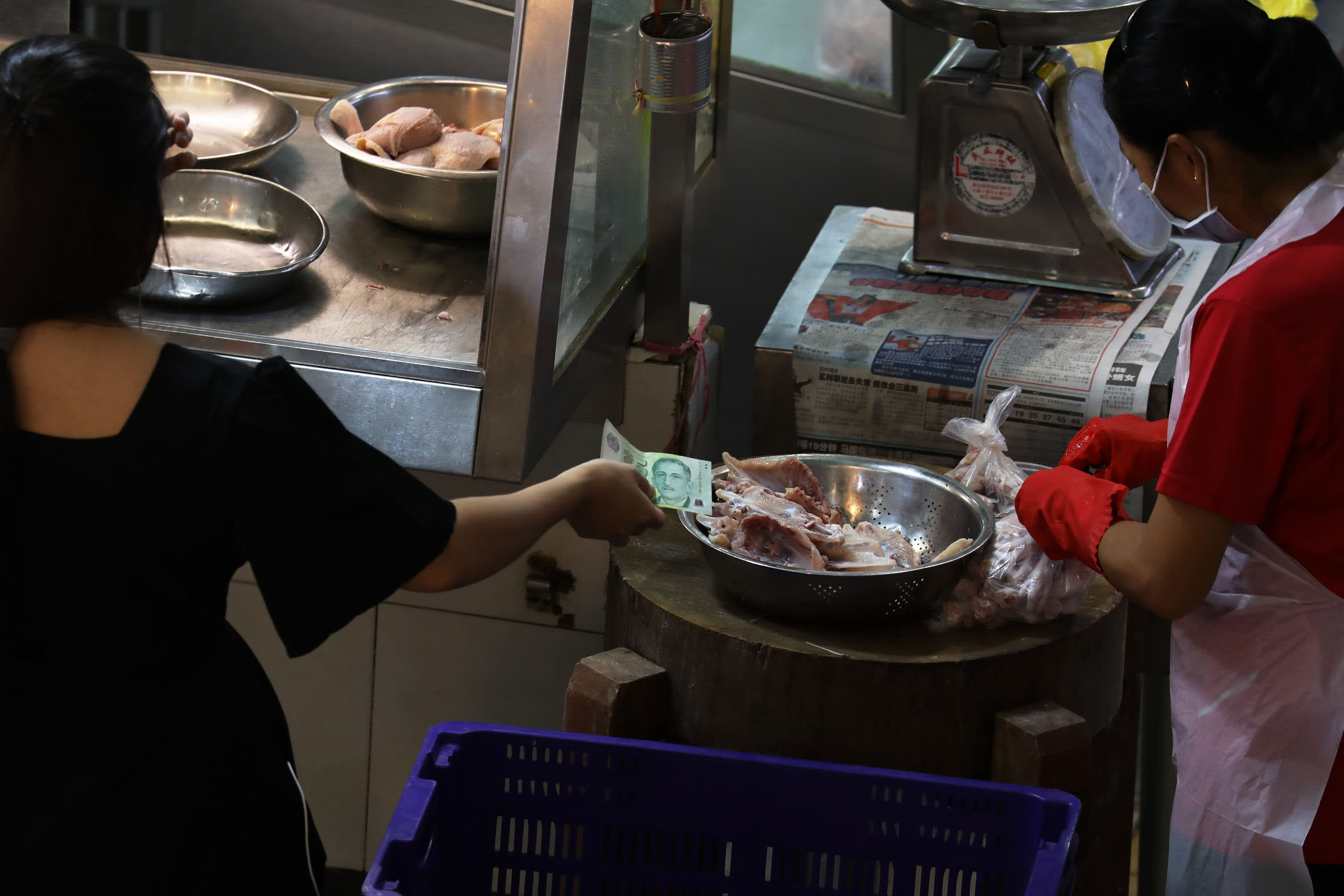The Big Read in short: Families tighten their belts as inflation continues to bite

Inflation, the measure of how fast the prices of goods and services rise, has made headlines in the last few months as the biggest economic challenge of 2022 not just for Singapore, but for many other countries as well.
Each week, TODAY’s long-running Big Read series delves into the trends and issues that matter. This week, we look at how families are resorting to various ways to save money amid the rising cost of living. This is a shortened version of the full feature, which can be found here.
- Amid persistent inflation, households here have begun tightening their belts and using different ways to save money
- Despite such adjustments, the families still find themselves digging deeper into their pockets to make ends meet
- Economists expect prices to remain elevated for an extended period, possibly up to two years
- Low-income families said their expenditures have already been pared to the bone, and they have to resort to cutting back on basics
- Financial experts give practical tips to save money in times like these

BY
NABILAH AWANG
Published April 9, 2022Updated April 11, 2022
WhatsAppTelegramFacebookTwitterEmailLinkedIn
SINGAPORE — When his petrol cost started to almost double to S$300 a week last month, warehouse manager Vincent Chok decided to save money by taking the bus from his four-room public housing flat in Punggol to Tai Seng MRT station where his bicycle is parked, and then cycling the last mile to his office in the vicinity.
He has been doing that since but the 42-year-old sole breadwinner for his family of five is not the only one who has had to make adjustments.
ADVERTISEMENT
On weekdays, his wife now takes the bus to ferry their two younger children to and from preschool — a journey which takes 20 minutes, or twice the duration by car — while his eight-year-old son walks to his school nearby.
“We have to make these adjustments because I can no longer afford to drive the children to school in the morning,” said Mr Chok, who now drives his car only on weekends.
Like him, many other households have resorted to tighten their belts amid rising prices on multiple fronts — ranging from fuel, food to electricity.
“
We have to make these adjustments because I can no longer afford to drive the children to school in the morning.
Mr Vincent Chok, 42, who now drives his car only on weekends
”
READ ALSO
The Big Read: Stagflation nightmare — will prices keep rising even as a European war puts damper on economy?
Homemaker Lynn Sabari, 51, has completely stopped using air conditioners in her four-room flat in Bedok.
The mother of three children, aged between 11 and 26, also washes clothes only when they reach a full load for the washing machine and constantly reminds her children to switch off all appliances when leaving a room, after her utility bills rose by about S$30 last month.
ADVERTISEMENT
“Whenever I see the house is brightly lit, I always ask them: ‘Wah, so bright. Today is Hari Raya, is it?’” she quipped.
Similarly, Madam Mala Rai, 44, who has seen her household expenses gone up by about S$200 in recent months, has also made some changes in her household, such as cutting shower time for her entire family by half.
The administrator, who works in the service industry and lives in a five-room flat, said her two sons, aged 10 and 13, used to take showers lasting 10 to 15 minutes but have cut the time to between five and seven minutes after she showed them the utility bills.
Despite such adjustments, the families whom TODAY spoke to said they are digging deeper into their pockets to make ends meet as they try to ride out the inflation storm, which is unlikely to blow over soon.

READ ALSO
Rising cost of air travel, cars, accommodation set to keep inflation elevated in near term: MAS, MTI
Inflation, the measure of how fast the prices of goods and services rise, has made headlines in the last few months as the biggest economic challenge of 2022 not just for Singapore, but for many other countries as well.
ADVERTISEMENT
HOW LONG WILL PRICES STAY HIGH?
Based on latest official statistics released last month, Singapore's headline inflation rate rose to 4.3 per cent in February, its fastest pace in nine years, due to the rising costs of cars, air travel and accommodation.
Headline inflation covers the prices of all categories of goods and services, which include commodities like food and energy.
Meanwhile, core inflation, which excludes transport and accommodation, eased to 2.2 per cent in February from 2.4 per cent in January. The fall in core inflation was the result of lower rates of increase for services, food, electricity and gas.
Core inflation is expected to reach 3 per cent by the middle of this year, before easing later in the year. The Monetary Authority of Singapore is expecting core inflation to come in within 2 to 3 per cent this year while headline inflation is projected to be between 2.5 and 3.5 per cent.
ADVERTISEMENT
“
DBS senior economist Irvin Seah said it is very likely that Singapore will experience two years of 'higher than normal' inflation.
”
READ ALSO
Inflation, supply chain disruptions from Russia-Ukraine conflict may dampen Singapore's labour outlook: MOM
Ms Selena Ling, head of treasury research and strategy at OCBC Bank, said it is inevitable that inflation will stay elevated for longer given that it is being driven by both demand and supply, and the latter cannot be addressed by tightening monetary policies.
DBS senior economist Irvin Seah said it is very likely that Singapore will experience two years of “higher than normal” inflation, with the second round being policy-driven, especially due to the Goods and Service Tax hike that will be implemented in phases starting in January next year.
“Our full-year forecast for inflation this year is 3.8 per cent and next year, it’s 3.2 per cent. This is significantly higher than the historical 13-year average of inflation at about 2 per cent,” he said.
Maybank Kim Eng economist Chua Hak Bin projected that inflation may taper off by the fourth quarter of this year, but reach more acceptable readings in 2023 — provided prices stabilise, labour shortages ease and housing completions improve. Delays in housing completions are causing lower housing supply and higher rents, he said.
HOW LOW-INCOME FAMILIES ARE COPING
As inflation continues to send prices northwards, the Government earlier this week announced that it will bring forward the distribution of some support measures unveiled during Budget 2022 in February. Among other things, the disbursement of S$100 vouchers by the Community Development Councils will be brought forward from by the end of this year to the middle of May.
READ ALSO
Some economists increase S'pore inflation forecasts as Russia-Ukraine conflict escalates
Finance Minister Lawrence Wong, in a ministerial speech addressing concerns about high inflation and escalating business costs on April 4, said these are “immediate actions” that the Government will take to help Singaporeans cope with rising costs. He also announced extra aid for low-income families.
Several low-income families told TODAY that their expenditures have already been pared to the bone, and there are no frills left to cut.
“
We don’t go out, we don’t shop for clothes. We can only afford to buy daily necessities… I know that sometimes my children get frustrated because we don’t do anything anymore.
Ms Siti Fatimah Abdul Kadil, 40
”
One of them, Ms Siti Fatimah Abdul Kadil, has had to switch to low-cost staples, such as buying bread instead of cereal.“
I used to be able to buy a week's worth of food with S$50 but now there’s only so much you can do with that money. This has caused a lot of stress.
Ms Wendy Tan, 31, who is eating less food now so that her child does not have to do so
”
The single mother of five children, aged between 12 and 23, said the rising cost of everything — from meat to fresh vegetables — leaves her with little money left to buy things for her three school-age children. Her two older children have moved out of their two-room rental Housing and Development Board (HDB) flat.
Ms Siti, a 40-year-old self-employed online retailer, said they have already been leading a spartan lifestyle and she doesn't know how else she can cut back on her spending.
“We don’t go out, we don’t shop for clothes. We can only afford to buy daily necessities… I know that sometimes my children get frustrated because we don’t do anything anymore,” said Ms Siti, who was diagnosed in January with polycystic kidney and polycystic liver disease, conditions where cysts grow in the kidney and liver. “But I tell them that this is not going to be forever, so they have to tahan (bear) a bit.”

READ ALSO
Inflation, volatility from Ukraine war to have impact, BHP's Henry says
Ms Siti said she has applied for financial assistance at an SSO. Responding to TODAY's queries, an MSF spokesperson said the SSO is processing Ms Siti's application, and the assessment is expected to be completed within two to four weeks after she submits the necessary documents.
The spokesperson added that Ms Siti's children are receiving Ministry of Education financial assistance and the SSO has linked her up with Doctors-On-Wheels, a free clinic programme run by the Woodlands Grassroots Organisations and SATA CommHealth.
Like Ms Siti, single mother Wendy Tan, 31, said she is careful with every dollar she spends and keeps a tight rein on her family’s modest budget. Ms Tan lives with her five-year-old daughter in their one-room HDB rental flat
Ms Tan, who works as a part-time service crew because she has to care for her child, can only afford to make partial payments for her utility, water, conservancy and phone bills each month, which has resulted in an accumulation of arrears of about S$300 in all.
“I used to be able to buy a week's worth of food with S$50 but now there’s only so much you can do with that money,” she said. “This has caused a lot of stress.”
With the same amount of money getting less food on the table, Ms Tan added that she eats less now, so that her child does not have to do so.
READ ALSO
Most economists expect core inflation to stay above 2% for 2022 after prices rose at fastest pace in 9 years
The MSF spokesperson said Ms Tan’s family was supported with its Short-to-Medium Term Assistance scheme from December last year to February, and she did not renew the assistance after she found employment. The family is receiving childcare subsidies for her daughter’s preschool education, added the spokesperson.
The Short-to-Medium Term Assistance scheme provides temporary financial support for low-income individuals or families who are temporarily unable to work, are looking for a job or are earning a low income and require assistance.
PRACTICAL TIPS TO SAVE MONEY
With inflation taking a big bite out of many household budgets, Singaporeans may want to rethink the way they spend their money and how to stretch every dollar, financial experts said.
Here are some tips for families to get more bang for their buck:
TIP #1: REVIEW FINANCES REGULARLY
READ ALSO
Explainer: Why living costs look set to increase in 2022
Keeping track of household expenditure can help families see what they can cut back on and tailor their budgets to fit their needs.
Mr Kyith Ng, who runs finance blog Investment Moats, said as prices are increasing so frequently, families should go through their budget with a fine-tooth comb at least once every quarter.
This is also a good time to divide expenditure into two groups — core expenses and the "good-to-have". Examples of core expenses are electricity and water tariffs while good-to-have expenses could be subscription services to video streaming sites.
People are likely to have limited success cutting the frequency of their core expenses but they may be able to switch to items that are more budget-friendly, said Mr Ng, who works for wealth advisory firm Providend.
Financial experts said the less important items in one’s budget can also be removed, such as cancelling a subscription service.

Mr Joel Koh, who contributes to personal finance app Seedly’s blog, cited the examples of gym memberships that are hardly utilised, as well as subscriptions to video streaming platforms, online magazines and food delivery services.
TIP #2: SHOP WISELY
When shopping for groceries, which usually make up the bulk of household spending, families can use several cost-effective methods.
One, opt for house brands offered by supermarkets, which are significantly cheaper than their branded counterparts and “don’t taste that much different”, said Ms Dawn Cher, author of financial blog SG Budget Babe.
Non-perishables can also be bought in bulk where possible to save money, she added, though this depends on one’s storage space at home.
Mr Colin Lau, 51, an early retiree who subscribes to the Fire (financial independence, retire early) movement, said he frequents shops near closing time to get a good discount for fresh produce.
Fire proponents believe that they can achieve their goal by saving hard, investing well and living frugally from young.
The self-described "extreme cheapskate", who runs a blog under the same name, claimed he has brought his monthly spending down to less than S$100 with this method. He added that one should also not be ashamed of asking stall owners for discounts, especially near their closing time.
TIP #3: PAY WITH THE RIGHT CARD
Mr Chris Chong, who runs a YouTube channel Honey Money SG, which doles out financial advice to young adults, said that individuals can pay with the credit card that gives the most rebates back on groceries.
They can also check with their credit card providers for cashback offers and use their accumulated savings to lower monthly credit card bills.
While there is a perception that credit cards can cause people to incur more debt. In fact, Mr Chong noted that there are benefits when signing up for such cards, as providers usually offer free gifts or cashback to new signees. Nevertheless, he cautioned that those who use credit cards should be people who have more control over their spending.
TIP #4: FIND WAYS TO INCREASE INCOME
On top of stretching every dollar, individuals can also increase their income by starting side hustles, said Mr Chong.
Depending on an individual’s skill sets and how they can be monetised, these include giving tuition or taking up freelance work such as being a freelance writer or a wedding photographer on weekends.
While starting a side hustle comes with some form of commitment, which may in turn eat into one’s time and energy, growing one’s income is the best way to protect oneself against inflation, he said.
With inflation here to stay for an extended period, some of the families interviewed are contemplating more drastic measures.
Mdm Lynn, the homemaker and mother of three, plans to start buying groceries in Johor Baru now that the border has reopened, in the hope of spending less due to the favourable exchange rate. “I’m not sure if it will be worth it but we will give it a try,” she said.
Mr Chok, the warehouse manager, said he might give up his car entirely at the end of the year if the cost of living continues to rise.
“It took me very long to save up for that car… But I’m ready to give it up if it means taking that burden off our shoulders,” he said.

